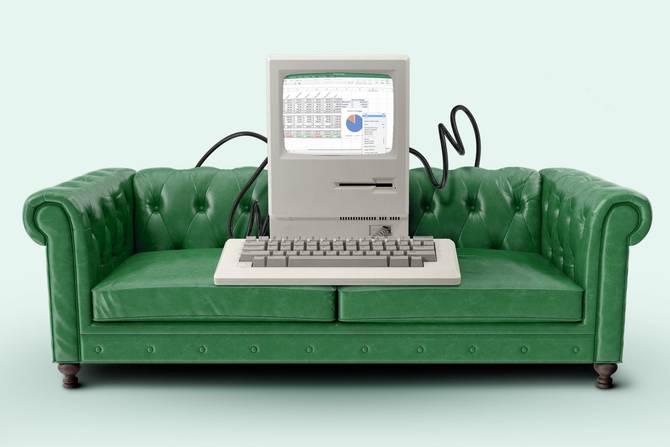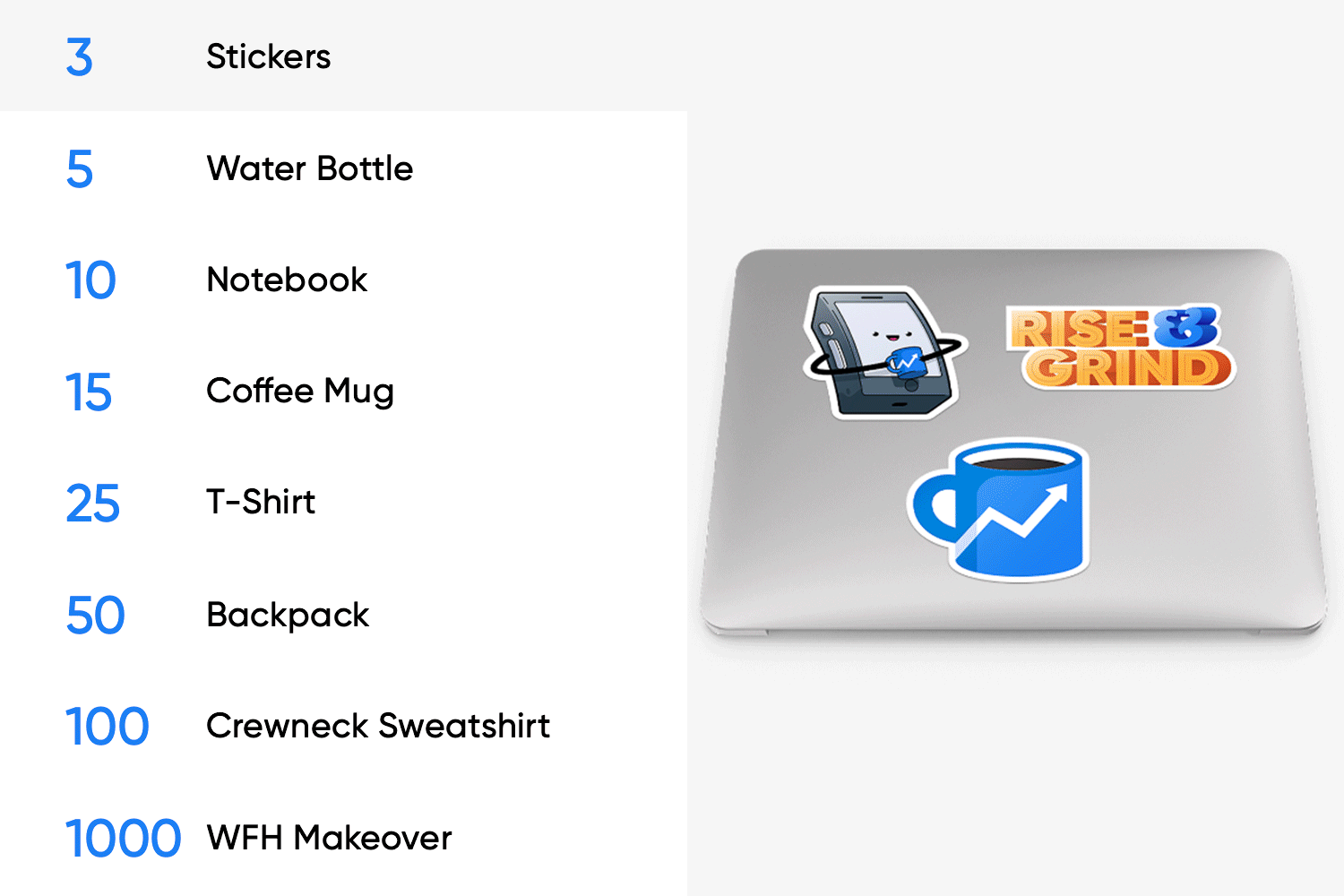Hi there! Here in NYC, the mayor is dropping mask mandates, and we’re savoring the first hints of spring with unfettered noses. Hope the weather’s more like a lamb than a lion wherever you are.
And if you want to read today’s stories on our website, simply click the links below.
In today’s edition:
 Financial well-being Financial well-being
 Neurodivergent Neurodivergent
 Chief chat Chief chat
—Susanna Vogel, Kristen Parisi, Sam Blum
|
|
Ian McKinnon
According to a report from the Federal Reserve Bank of New York, Americans added $333 billion of aggregate household debt in quarter four of 2021—that’s a sharper increase than at any time in the last 14 years and brings the national total to $15.58 trillion.
If reading that makes you want to close all your tabs and crawl into bed, you’re not alone. A 2021 survey from SHRM and Morgan Stanley at Work on the financial well-being of Americans found that monetary stressors and mental health are, for many respondents, linked. As of June, nearly a third of working Americans surveyed reported that during the pandemic they experienced finance-related anxiety and almost 20% reported experiencing finance-related depression. The numbers are higher for those who are unemployed.
Yet, even as companies invest in mental health benefits such as teletherapy and employee assistance programs, fewer have reportedly made similar investments in financial well-being programs. According to the same SHRM/Morgan Stanley report, only one in four HR professionals surveyed said their organization had added or expanded existing financial well-being benefits to “help employees manage their financial stress since the start of the Covid pandemic.”
The SHRM/Morgan Stanley report suggests corporations that adopt such benefits could have a recruiting advantage: Their data suggests unemployed Americans “tend to value financial wellness benefits more than working Americans,” and could view such benefits as “welcome incentives” when choosing a workplace.
One company that’s banking on this prospect is Northwell Health, New York State’s largest health care provider. Keep reading here.—SV
Do you work in HR or have information about your HR department we should know? Email [email protected] or DM @SusannaVogel1 on Twitter. For completely confidential conversations, ask Susanna for her number on Signal.
|
|
Gremlin/Getty Images
In February, Microsoft Accessibility, which provides disability hiring resources for job seekers and employers, announced the pilot phase of its Neurodiversity Career Connector (NDCC), a job portal specifically developed to connect neurodiverse candidates with employers committed to being inclusive of them. Employers who are members of the Neurodiversity at Work Roundtable can use the NDCC to source talent or post job listings to attract neurodiverse candidates.
Neurodivergence is when a person’s brain functions differently than what’s considered standard or typical. Neurodivergence includes (but is not limited to) autism, dyslexia, Tourette syndrome, and ADHD.
According to a LinkedIn post from Microsoft’s director of inclusive hiring and accessibility, the program is “a simple way for neurodivergent job seekers to connect to organizations that intentionally hire, support, and grow neurodivergent talent.”
What’s behind the NDCC? The NDCC beta program has the support and involvement of the members of the Neurodiversity @ Work Employer Roundtable, a collection of employers dedicated to creating and executing on neurodiversity hiring initiatives. According to the NDCC homepage, at least one in 15 Americans is neurodivergent. Disability:IN and Microsoft established the Roundtable in 2017 and it currently has more than 40 corporate members, including IBM, Deloitte, Wells Fargo, Dell, and Warner Brothers.
According to The Center for Neurodiversity and Employment Innovation at the University of Connecticut, the unemployment rate for neurodivergent adults runs as high as 40%, eight times the rate of non-disabled adults.
How does it work? If employers want to post jobs on the NDCC, they must be part of the Roundtable, have a neurodiversity hiring program that’s been active for at least one year, and be publicly committed to supporting neurodivergent talent. The Roundtable admits new members on a monthly basis, allowing them to post jobs to the site.—KP
HR Brew will keep you updated on new hiring programs that are trying to transform the workplace.
Do you work in HR or have information about your HR department we should know? Email [email protected] or DM @Kris10Parisi on Twitter. For completely confidential conversations, ask Kristen for her number on Signal.
|
|
|
Ever since the start of the (sigh) pandemic, the number of people who have felt little to no control over their personal and professional lives has—understandably—more than doubled.
This intel comes courtesy of Oracle’s partnership with Workplace Intelligence on their fourth consecutive AI@Work study. Together they surveyed 14,400+ people across 13 countries to zoom in on these stats.
And they found that employees worldwide are ready to take back control of their careers and futures using the power of tech.
85% of people want technology to help define their futures by identifying the skills they need to develop, and 32% want tech to provide them with the next steps necessary to progress toward their career goals.
Sensing a theme? Yep. AI is helping people feel empowered. And AI@Work: The Miniseries explores the human stories behind these eye-opening numbers.
Check it out here.
|
|
Brian Miller is the chief talent, diversity, and inclusion officer at the software giant Adobe. Overseeing HR at an organization of Adobe’s size—the company has around 25,000 employees globally across 66 office locations—means the normal responsibilities of an HR chief are put on steroids.
Miller takes a granular approach to the big job he’s tasked with, however, placing an emphasis on DE&I initiatives that spread throughout the organization. An emphasis on diversity and belonging is built into employee engagement and retention and informs Miller’s broader philosophy.
HR Brew recently talked to Miller about how culture starts with middle management, the importance of DE&I, and his gig at Adobe, which he started just six months ago.
This interview has been edited and condensed for clarity.
What motivated you to get into the human resources field? I have always been a very curious person. And I’ve always been enamored with, “How do you really help people learn and grow?” It started way back before I joined HR [and when I] was a teacher. I taught fifth- through eighth-grade math. So I’ve always had this curiosity about how do you really help, whether it’s students or employees, be the best version of themselves. And I think that brought me into HR.
I have often been more curious about…how you put a business mindset to this idea of what I call “helping employees reach their full potential?” So if you think about it from a business standpoint—shareholder value, the ability to really generate customer experiences that drive product innovations—you want to think very similarly about how do I really maximize employee potential and help them reach their full potential as well?
How does the emphasis on diversity in your role inform your approach to all other aspects of the HR business? Keep reading here.—SB
|
|
TOGETHER WITH BETTERMENT AT WORK
|
|
What benefit do many employees want but few companies offer? Say it with us: Student Loan Management. Betterment at Work is here to change that. Millions of people deal with financial obstacles from student loans, and employees are looking to their companies for support. Secure top talent by going beyond the 401(k) and offering a financial wellness package that employees can’t find anywhere else. Get started here.
|
|
Today’s top HR reads.
Stat: Salesforce recently experimented with an “Async Week,” during which about 20,000 employees canceled routine meetings to focus on their individual work; 72% of the participants “said it made them more productive and 70% reported it made them less stressed.” (The Wall Street Journal)
Quote: “Every company should accept that, for a certain part of the organization, work from anywhere will be the reality of our lives. What is important is that we are organizing it in a way that the face-to-face collaboration and the connection to the culture of the organization is not lost.” — Christian Ulbrich, president and CEO of Jones Lang LaSalle, speaking about the post-pandemic office with Charter
Read: Does your company need a workplace violence prevention program? (EHS Daily Advisor)
Attract and retain talent: Get a handle on what’s important to both candidates and current employees with help from Qualtrics. Their playbook breaks down the 5 KPIs and 25 drivers that top HR teams use to create a world-class employee experience. Get the playbook here.*
*This is sponsored advertising content.
|
|
CHECK OUT MONEY WITH KATIE
|
|
Our new weekly newsletter that takes a spicy approach to spending habits, investing best practices, and tax strategies. Katie dives deep into the psychology of money and shows you how to upgrade your lifestyle (and happiness) regardless of your income bracket. Subscribe here.
|
|
-
Nvidia, the computer chip maker, has been hit with a cyberattack by hackers who are “threatening to release Nvidia’s trade secrets, including schematics, source code, and information on recent Nvidia graphics chips.”
-
OSHA has proposed over $3 million in penalties in 55 inspections at Dollar General stores since 2016, accusing the discount retailer in a press release of a “long and extensive history of workplace safety violations and repeated failures to protect its workers.”
-
Activision Blizzard is being sued by the parents of a former employee who allege that “pervasive sexual harassment” at the company was a “substantial factor” in her death “and that her supervisor and the company didn’t fully cooperate with police afterward.”
-
The Treasury Department released a report on Monday indicating that US employers “often face little competition for their workers, allowing them to pay substantially less than they would otherwise.”
|
|
Catch up on the top HR Brew stories from the recent past:
|
|


|
|
Written by
Susanna Vogel, Kristen Parisi, and Sam Blum
Was this email forwarded to you? Sign up here.
WANT MORE BREW?
{if !contains(profile.lists,"Daily Business")}
Get the daily email that makes reading the news enjoyable →
{/if}
{if !contains(profile.lists,"EmTech Brew") || !contains(profile.lists,"HR Brew") || !contains(profile.lists,"Marketing Brew") || !contains(profile.lists,"Retail Brew")}
Industry news, with a sense of humor →
{if !contains(profile.lists,"EmTech Brew")}
-
Emerging Tech Brew: AI, crypto, space, autonomous vehicles, and more
{/if}
{if !contains(profile.lists,"Marketing Brew")}
-
Marketing Brew: the buzziest happenings in marketing and advertising
{/if}
{if !contains(profile.lists,"Retail Brew")}
-
Retail Brew: retail trends from DTC to "buy now, pay later"
{/if}
{/if}
{if !contains(profile.lists,"Money Scoop") || !contains(profile.lists,"The Essentials") || !contains(profile.lists,"Money With Katie")}
Tips for smarter living →
{if !contains(profile.lists,"Money Scoop")}
-
Money Scoop: your personal finance upgrade
{/if}
{if !contains(profile.lists,"Money With Katie")}
-
Money With Katie: manifest your financial freedom
{/if}
{if !contains(profile.lists,"The Essentials")}
-
Sidekick: lifestyle recs from every corner of the internet
{/if}
{/if}
 Podcasts →
Business Casual
and
Founder's Journal
Podcasts →
Business Casual
and
Founder's Journal
 YouTube
YouTube
Accelerate Your Career →
-
MB/A: virtual 8-week program designed to broaden your skill set
|
ADVERTISE // CAREERS // SHOP // FAQ
Update your email preferences or unsubscribe here.
View our privacy policy here.
Copyright © 2022 Morning Brew. All rights reserved.
22 W 19th St, 4th Floor, New York, NY 10011
|
|









